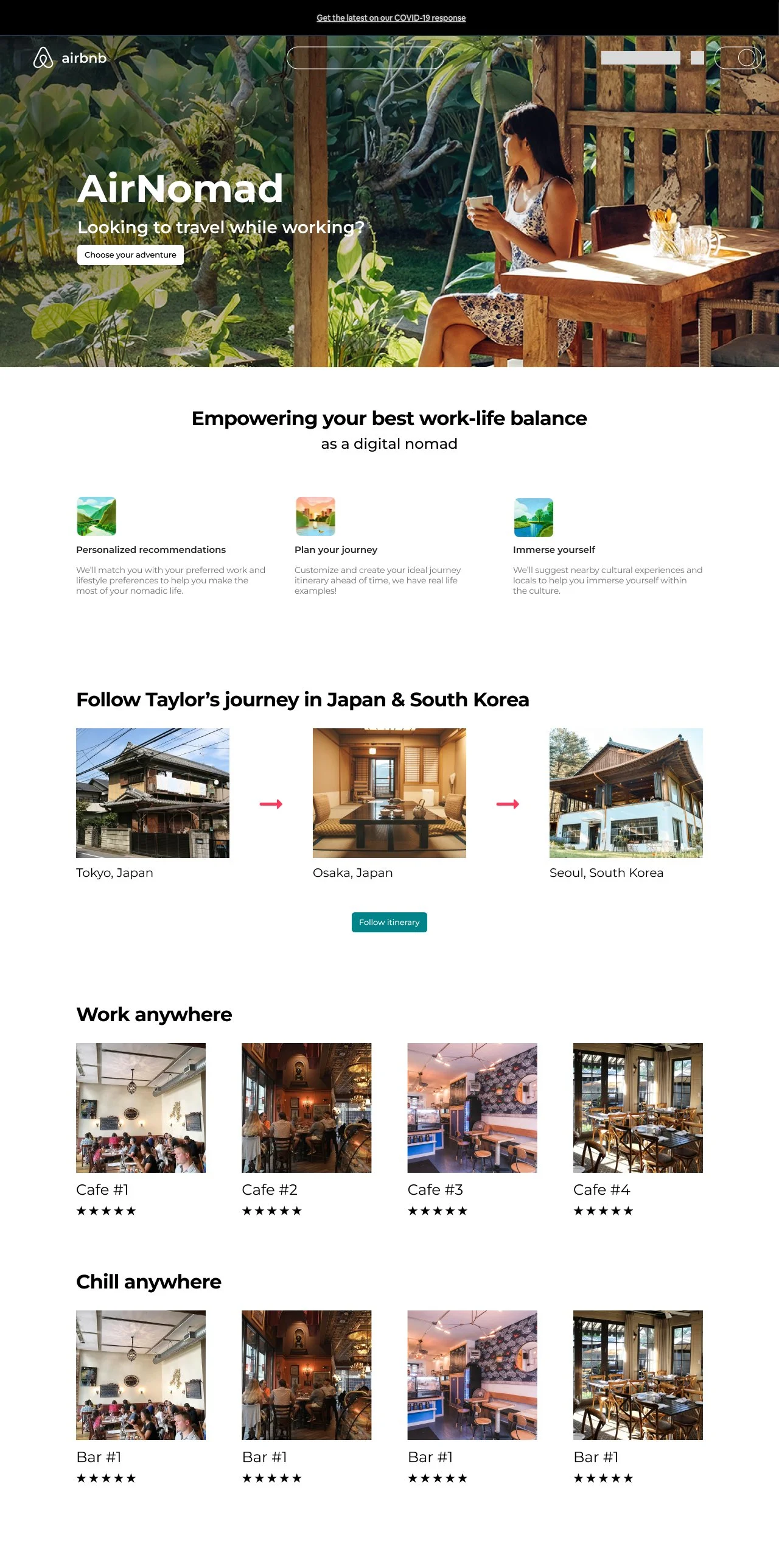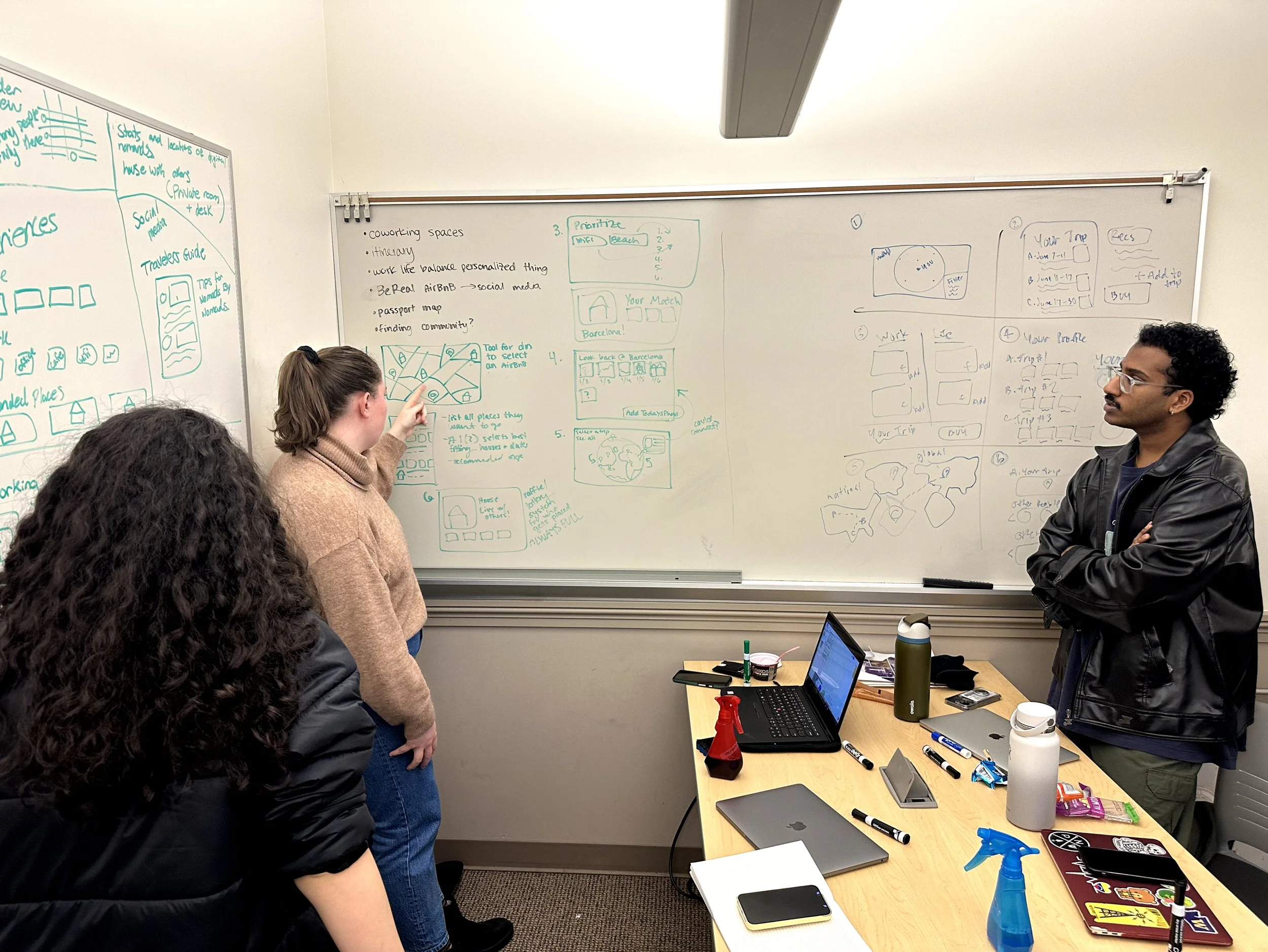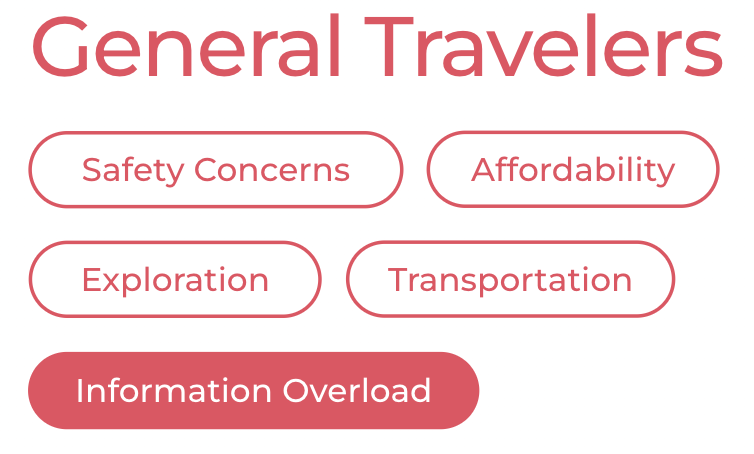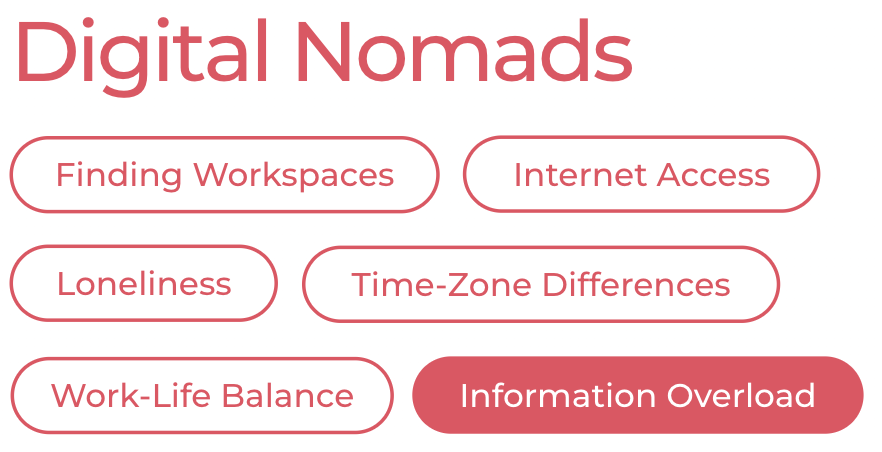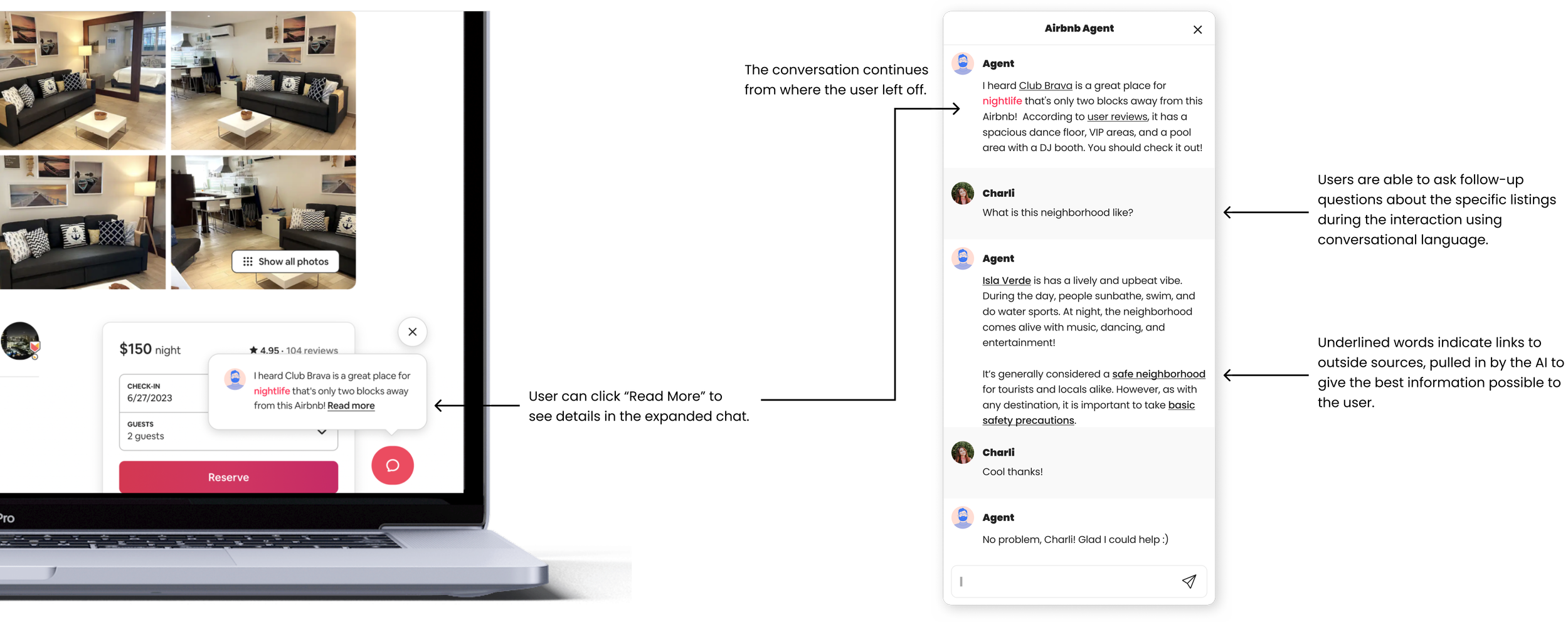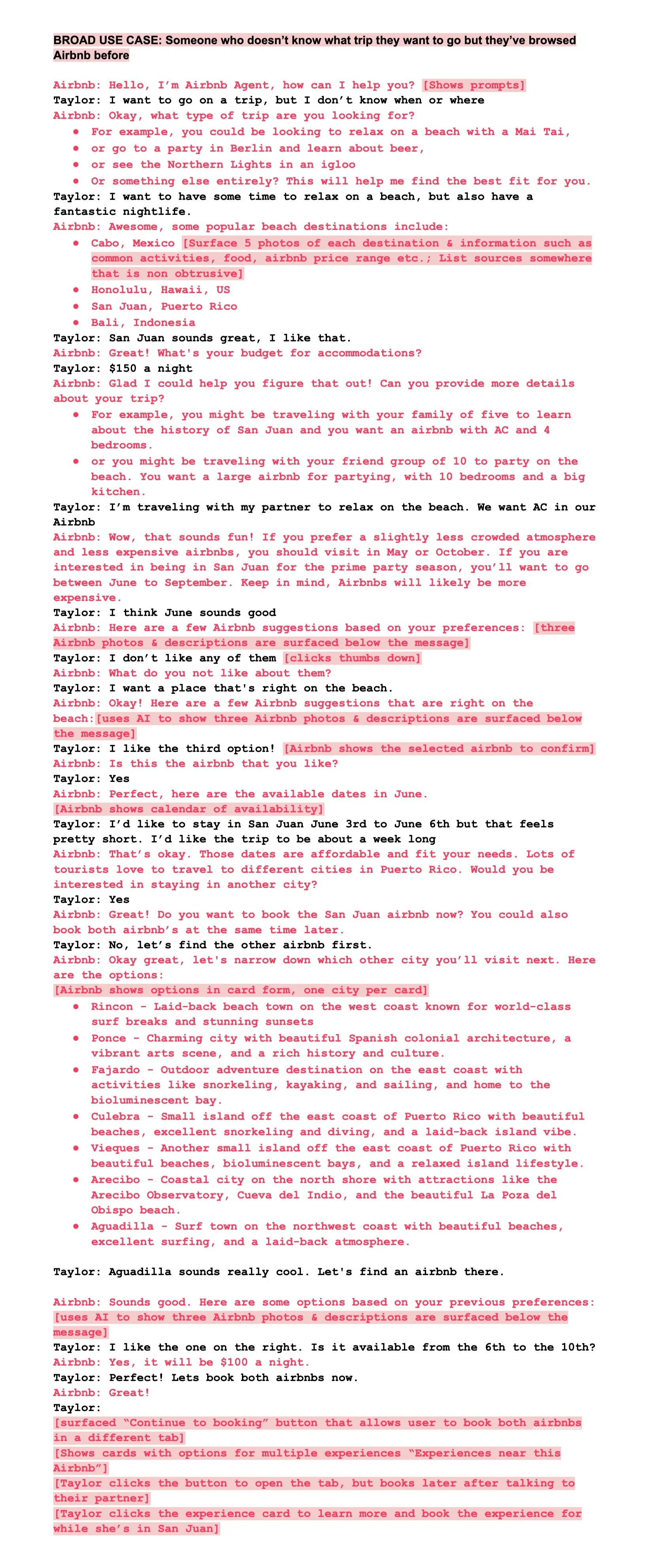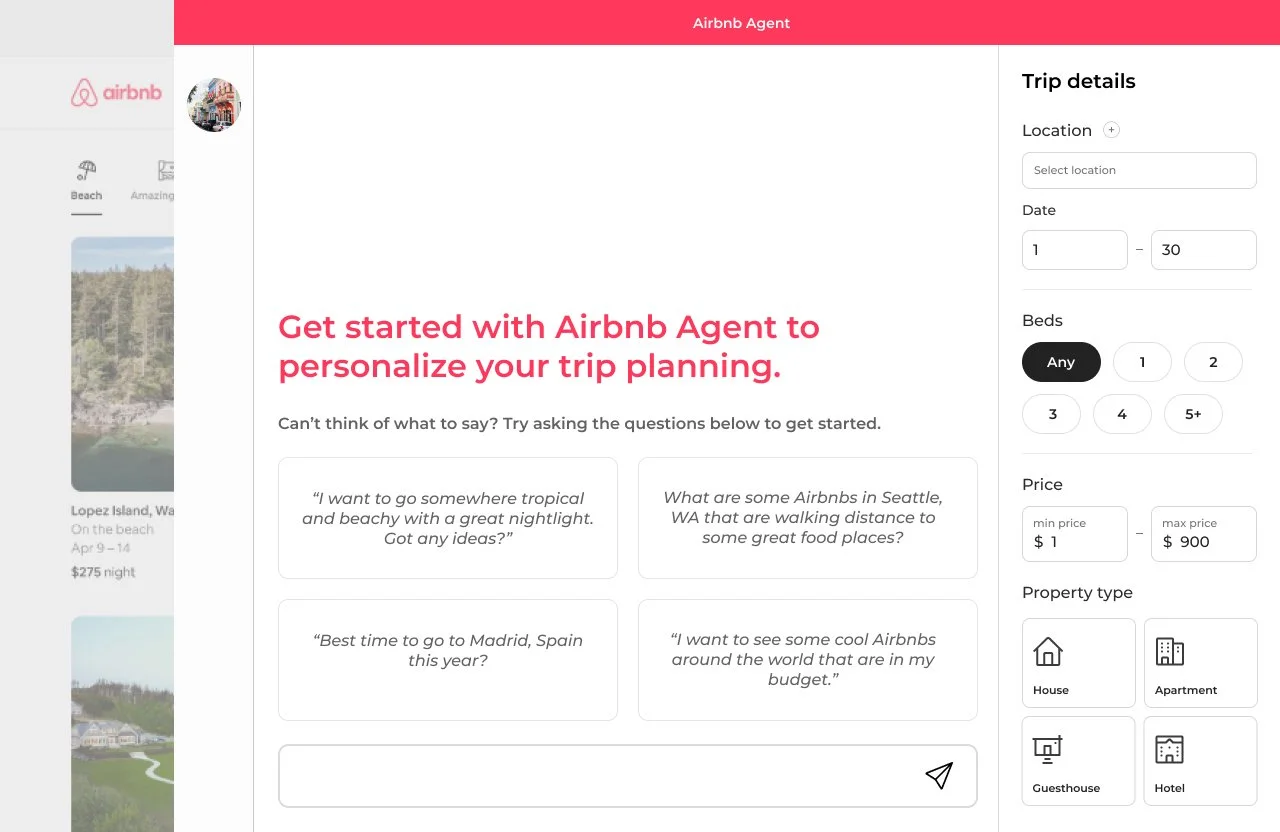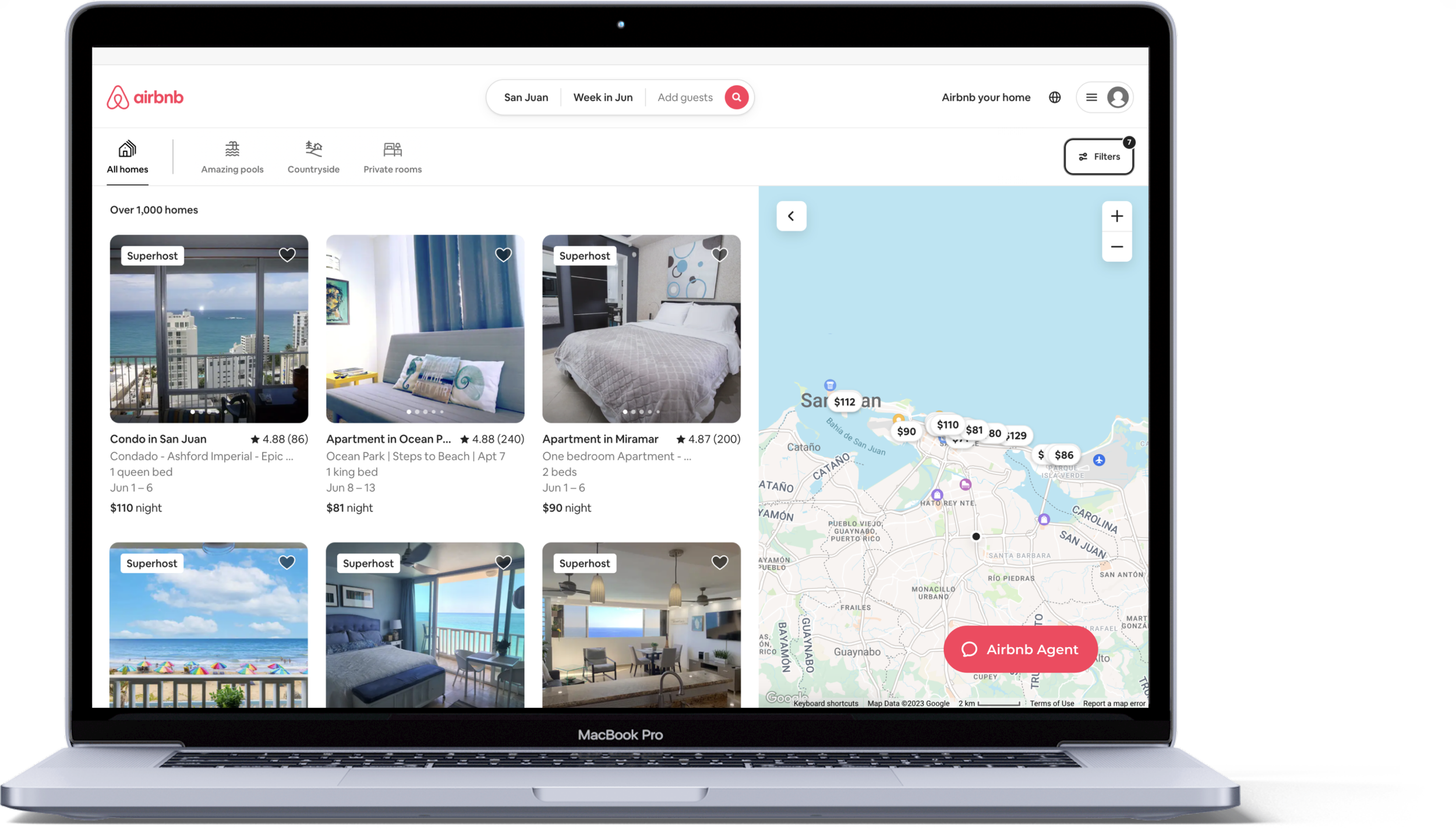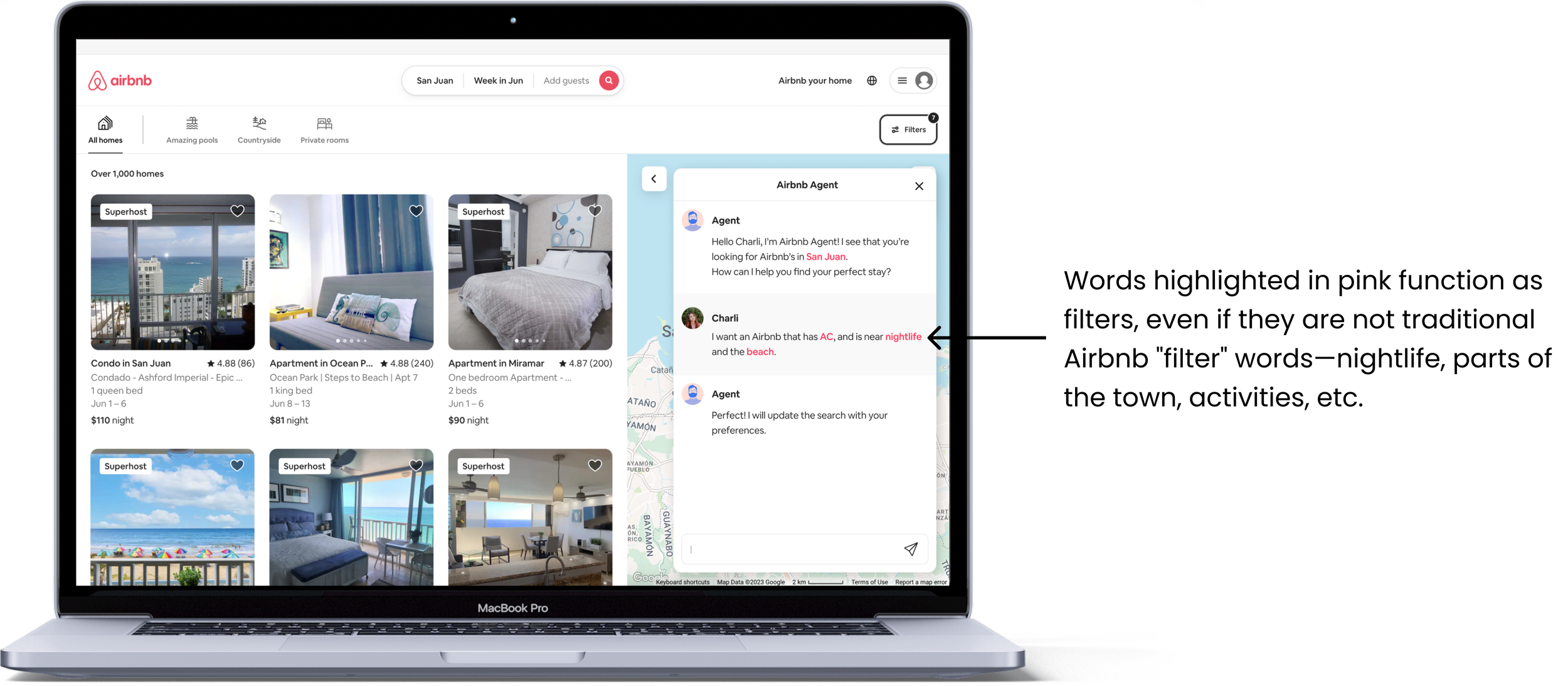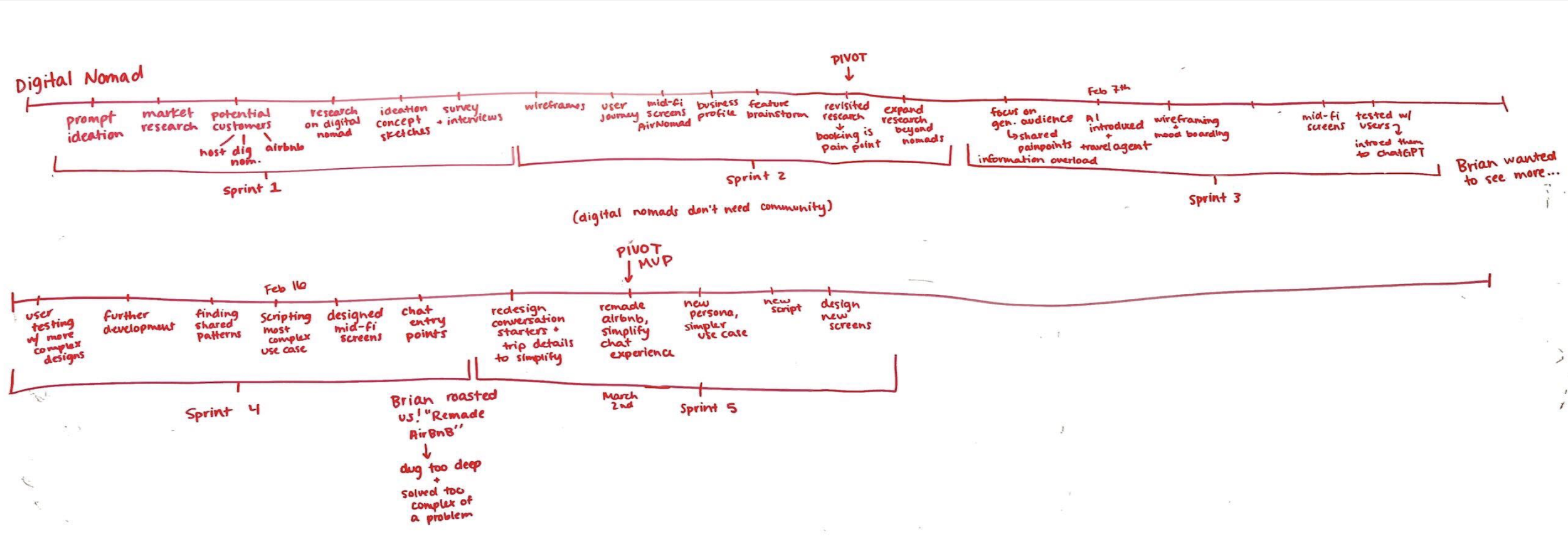Airbnb Agent: Integrating AI into Airbnb
January - March 2023 (11 weeks)
Web Application AI Ambiguous Design Challenge
-
During the 11 weeks, I served as product designer and content strategist, enhancing customer satisfaction for over 150,000,000+ users by designing an optimized AI travel agent on Airbnb's web application.
-
Content Strategy, FigJam, Figma, Information Architecture, Iteration, Notion, Persona Crafting, Rapid Prototyping, Storytelling, Synthesis, UI/UX Design, User Research, User Testing, Web Application Design
Overview
In my Applied Product Design course, my team of six was tasked with an ambiguous design challenge that a company was currently facing—over the course of the quarter we would iteratively develop a solution.
Throughout 11 weeks, we developed Airbnb Agent, a personalized AI travel agent that optimizes the browsing experience on Airbnb. Minimizing information overload, our solution integrates AI into the platform in a meaningful and powerful way. But this is a long way from where we originally started the quarter.
The Challenge
In the first week of class, we were presented with a blank canvas prompt: “Airbnb is exploring the idea of creating a Passport service, allowing subscribers to be able to travel around the world via multiple Airbnb stays, or be digital nomads, working remotely at various locations. They need help defining the product, including positioning and design."
To kickstart the project, our first step was to decode the term digital nomads, individuals who work remotely from various locations rather than a fixed workplace. Armed with this understanding, we launched into a comprehensive research journey, diving into secondary resources like literature reviews, market assessments, and user inquiries. This research laid the groundwork for our initial concept ideations.
Concept One: AirNomad
After extensive secondary research, our brainstorming sessions swiftly led to AirNomad. This concept, born during an intense 8-minute ideation sprint, served as a rapid prototype, providing a glimpse into a dynamic Airbnb tailored for digital nomads.
Grounded in our initial research on digital nomads and their travel needs, AirNomad caters to users by empowering them to:
Discover Co-Working Spaces: An all-in-one solution for digital nomads to effortlessly find co-working spaces that matched their professional requirements.
Foster a Thriving Community: Recognizing the importance of social connections, AirNomad sought to foster a vibrant nomadic community, uniting like-minded individuals on their journeys.
Support Work-Life Balance: Equipped with a wealth of resources and tools, AirNomad aimed to help digital nomads strike a harmonious work-life balance, optimizing their remote working experiences.
User Pain Points
Upon introducing AirNomad to the digital nomad community, the response was underwhelming. Feedback from over 30 respondents, including seasoned digital nomads and traditional travelers, highlighted that our envisioned features, especially community-building, didn't resonate with our target audience.
However, our research uncovered a recurring pain point: information overload. Users expressed frustration with the cumbersome process of sifting through multiple platforms like Google, Airbnb, and Expedia to plan their trips, sometimes even leading to booking abandonment.
In response to this critical user feedback, a clear consensus emerged—a desire for a consolidated platform that harmoniously centralizes vital information. Users sought a streamlined experience for discovering travel options that align with their preferences, prompting a pivotal shift in our design approach.
Updated Problem Space
In light of our previous revelations, we decided to reframe our prompt. Our revised directive now read:
Existing Solutions
To shape our new directive, we drew inspiration from two existing solutions that were making their mark in the travel industry: traditional travel agents and the burgeoning trend of AI chatbots.
Airbnb Agent holds immense value due to its exceptional adaptability to the user journey. It acknowledges the diverse concerns and preferences that each user brings to the platform and leverages the power of AI to meet users precisely where they want assistance. Airbnb Agent respects the importance of not overwhelming or taking control of the user's experience, which is why it discreetly resides as a chatbot in the bottom right corner. This thoughtful approach to integrating AI seamlessly into the Airbnb interface reflects a conscious design decision.
It doesn't take center stage but rather complements the existing user experience. This unobtrusive but transformative addition has the potential to redefine how users book accommodations and increase the overall number of bookings made, embodying a user-centric, intelligent evolution within the platform.
Travel Agents: In the past, people sought out travel agents for their wealth of expertise in crafting tailored travel experiences, ensuring a stress-free planning process for trips.
AI Chatbots: Today, AI technology has ushered in a new era of personalized responses to individual queries. Innovations like ChatGPT have spearheaded the adoption of natural language chatbots.
Our vision was to amalgamate the strengths of these two concepts into what we coined as the AI Travel Agent. This cutting-edge concept represents a natural language AI agent engineered to assist users in planning their trips and delivering personalized recommendations. Its core features encompass:
Leveraging Airbnb's comprehensive data to furnish users with precise information regarding bookings and Experiences—activities designed by local hosts or tour operators on Airbnb.
Offering users simplified, tailor-made recommendations rooted in their specific travel needs and preferences.
Engaging users in interactive, conversational exchanges to address their travel and Airbnb-related inquiries, fostering a more engaging and personalized experience.
Scripting and Wireframing
At the advice of our professor and faced with the challenge of fleshing out our concept, we decided to embark on a unique approach. We crafted a script that simulated the most intricate conversation a user might have with our AI travel agent, envisioning a wide array of potential use cases and message types that the AI could deliver. This exercise proved invaluable in nurturing our product experience.
As we meticulously dissected the AI chatbot's features and entry points, we ensured that our content strategy was firmly interwoven with our design considerations. This strategy involved understanding the nuances of various user interactions, including how to present information in a user-friendly and engaging manner. We took into account the tone, voice, and messaging consistency to create a cohesive and compelling user experience, ensuring that the content aligns seamlessly with Airbnb's brand identity.
From this, the next logical step was to return to our user testing phase. We needed to validate whether our users were indeed connecting with this innovative concept, ensuring it resonated with their needs and expectations.
User Testing Revisited
Initially, users weren't thrilled with the idea of a chatbot travel agent because of previous experiences with cumbersome customer service chatbots. However, when we introduced the power of ChatGPT and encouraged them to play around with it, users were excited about the potential of an AI travel agent.
Concept Two: Airbnb Agent
Following our user testing sessions, we redesigned our product into Airbnb Agent. However, during a valuable conversation with our mentor, we became acutely aware of a common product design pitfall we had fallen into: our project had unwittingly transformed Airbnb into our chat agent, as we continually added more use cases and functionalities to enhance the experience.
In light of this realization, we made a strategic pivot. We honed our focus on shaping a Minimum Viable Product (MVP) that seamlessly integrated AI into the existing Airbnb ecosystem. This shift was grounded in our research, affirming the value of our product experience. Rather than attempting to replicate Airbnb, we committed to enhancing and enriching the current Airbnb landscape, aligning with our original goals.
Introducing Airbnb Agent
To enhance the current Airbnb experience, we developed an improved concept that serves as a personalized AI travel agent to guide users throughout their browsing experience. This experience can be accessed through the Airbnb Agent button in the bottom right of the screen.
Users can interact with the agent at their own convenience across their user journey. For instance, if a user initiates an Airbnb search but finds themselves overwhelmed by the initial array of options, the agent steps in to provide guidance.
Our refined concept acts as a super-filter. Using the power of natural language processing, Airbnb Agent helps you narrow down search options based on your search inputs, even if they are not traditional Airbnb filter words—nightlife, parts of the town, activities, etc. It can also suggest cities, activities, and nearby tourist attractions that fit your interests and habits.
Future Iterations
In shaping the path forward for Airbnb Agent, we envision several key enhancements to the user experience:
Advanced Accommodation Filtering: Expanding our capabilities to enable users to efficiently sift through a diverse array of accommodations on the global Airbnb platform, providing more relevant options based on their preferences.
Enhanced Location Visualization: An update to the Airbnb map that dynamically highlights specific neighborhoods and locations as users search for accommodations, offering them a deeper understanding of the areas under consideration.
Comparative Listing Analysis: The ability to compare multiple Airbnb listings that align with a user's preferences. This feature will spotlight both similarities and differences, aiding users in making informed decisions that best suit their travel needs.
Reflection
Design is nonlinear. The design process is inherently nonlinear, and Airbnb Agent's evolution over the past ten weeks vividly illustrates this dynamic journey. We started with an ambiguous challenge, navigated rounds of research, and made multiple pivots before arriving at our final concept. While our product may not have originated directly from the initial prompt, we're confident that it's a robust idea, harnessing the potential of AI, a rising tech tool, and drawing inspiration from real-world practices like traditional travel agents.
Design is broad. Within this broad realm of design, we embraced the challenges of incorporating copywriting and conversational design to craft an AI travel agent's unique identity. Finding a style and tone that harmonized seamlessly with Airbnb's brand was a captivating endeavor. We actively engaged with users to understand how to build trust, deliver value, and ensure the AI's insights were recognizable and compelling enough to prompt user consideration.
AI is gaining popularity in the market. In tandem with our design journey, we observed the burgeoning popularity of AI in the market. This project was conceived during the early stages of AI integration, exemplified by ChatGPT's rise. As the quarter unfolded, AI found its way into diverse applications, from Notion to Spotify and Microsoft. Recognizing our ability to identify this design shift and develop a solution well-suited for today's market is not only exciting but also profoundly validating.


